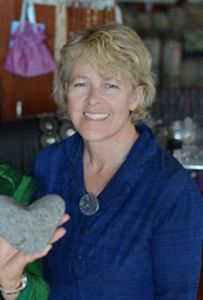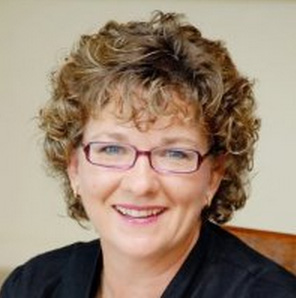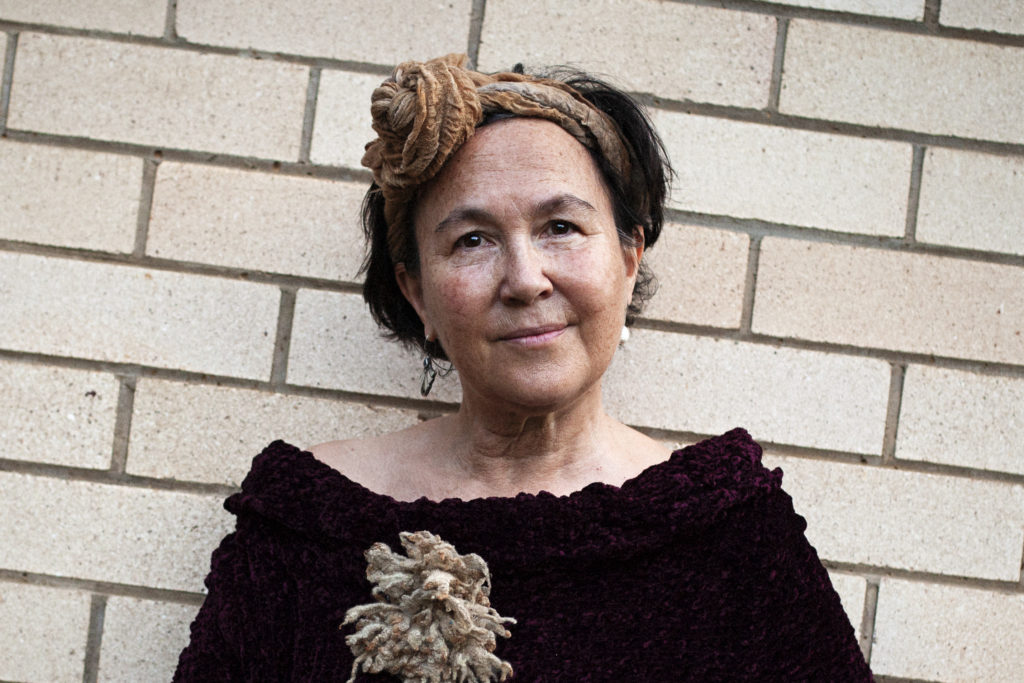Every day, we eat and we dress. We have become conscious of our food, it is time to become more conscious of our clothing. We believe in slow clothing: dressing for health and wellbeing rather than status and looks. We believe in ethical, sustainable choices that don’t harm people or the planet. We want to know the story about where clothing comes from and we believe in care and repair, refashion and restyle of existing clothing using simple sewing skills.
Jane Milburn established Textile Beat as a purpose-driven business in 2013, at Brisbane Australia, to inspire a creative approach to the way we dress, to embrace natural fibres and upcycling for pleasure, reward and sustainability. She is a sustainability consultant, author of Slow Clothing: finding meaning in what we wear, and a 2019 Churchill Fellow investigating ways that being more hands-on with our clothes can help reduce textile waste and enhance wellbeing. Jane trained as a climate reality leader and her work aligns with the United Nations’ Sustainable Development Goals.
Textile Beat philosophy is to slow down, take stock and consider the substance, not just the style, of the clothes you choose to wear. Become conscious of your wardrobe: buy less, choose natural fibres, mend what you have, value story, love second-hand and vintage, refuse cheap fashion, avoid toxic dyes, read labels, restyle what you have, share and swap, or buy ethical brands. If it suits you to do so, be empowered to sew, restyle and refashion clothing already in circulation. The slow clothing philosophy is summarised in a manifesto of actions and choices: think, natural, quality, local, few, care, make, revive, adapt and salvage.
Jane Milburn OAM: Sustainability consultant, Slow Clothing pioneer, TEDx speaker, Churchill Fellow, upcycler, and agricultural scientist.
Introducing Jane Milburn of Textile Beat 2019
Jane Milburn extended CV January 2020
Fresh from Australian rural leadership study, Jane embarked on the 365-day Sew it Again campaign throughout 2014 to bring together wide-ranging career and life experiences in a meaningful way. As with the rising interest in home cooking and food growing for health and wellbeing, Jane believes there is a pressing need to rethink our approach to dressing for sustainability. Jane’s model includes empowering individuals to be more engaged and connected to clothing they already own. The Sew it Again project explored ways to reuse existing clothing and textile resources. View the 365 garments on pinterest then search their number on the project website sewitagain.com for details.
Jane is part of the Fashion Revolution bringing awareness to who made our clothes and the fact that loved clothes last.
Textile Beat aims to:
- utilise creativity through purposeful and resourceful socially-conscious activity
- contribute to sustainability by influencing society to reuse, reduce and recycle
- empower receptive individuals by engaging them and passing on knowledge
- inspire others to utilise and value the beauty of natural fibres
- connect with nature, natural resources and those who care about them
Textile Beat is guided rural leadership colleagues.
 Elly Cook: Organic beef producer and community advocate
Elly Cook: Organic beef producer and community advocate
As an organic beef producer who lives holistically on a property in central western New South Wales, Elly’s journey of life on the land and enterprising business skills in rural communities has led her to forge a pathway for inspiring and motivating positive change. Elly grew up in a large family home full of enterprising women, she feels comfortable wearing secondhand clothes and can appreciate beauty and a bargain. When receiving a compliment on what she is wearing, Elly has a wonderful sense of achievement that it has been re-created or revived. Elly believes nurturing her creative side is a natural part of living and leading true to your values.
Georgie Somerset: beef producer and board member
 Georgie is a regional strategist and rural leader with experience in agribusiness, rural tourism and regional development. Her work involves identifying opportunities, resolving issues and creating linkages and networks across rural sectors. Actively involved in the family-owned beef property in Queensland’s South Burnett and mother of three children, Georgie also has a number of board roles including with AgForce Queensland, the ABC and the Royal Flying Doctor Service. She was recognised in the 2014 Westpac Australian Financial Review’s 100 Women of Influence and was awarded Outstanding Contributor to Rural Australia in the inaugural Women in Australian Agribusiness 100. Georgie is a fellow of the Australian Rural Leadership Program (2010) and believes in lifelong learning and education.
Georgie is a regional strategist and rural leader with experience in agribusiness, rural tourism and regional development. Her work involves identifying opportunities, resolving issues and creating linkages and networks across rural sectors. Actively involved in the family-owned beef property in Queensland’s South Burnett and mother of three children, Georgie also has a number of board roles including with AgForce Queensland, the ABC and the Royal Flying Doctor Service. She was recognised in the 2014 Westpac Australian Financial Review’s 100 Women of Influence and was awarded Outstanding Contributor to Rural Australia in the inaugural Women in Australian Agribusiness 100. Georgie is a fellow of the Australian Rural Leadership Program (2010) and believes in lifelong learning and education.
…………
READ MORE:
Jane Milburn grew up surrounded by women who knew how to sew, stitch, and live simply on their sheep farm at Owaka in the South Island of New Zealand. With food predominantly home-grown and home-cooked on the farm, clothing was often similarly hand-created, modified or mended by generations of women including Jane’s mother Elizabeth, a university-educated home economics teacher, grandma Garth and great-grandma Mary, traditional homemakers. In this environment, natural resources such as wool, linen, cotton, fur, wood and water were valued and used in accordance with the ‘waste not want not’ philosophy which was the norm for generations past.
In between being named as Little Miss Owaka, studying agricultural science at The University of Queensland, working as a rural reporter and being judged 2010 Queensland runner-up in the RIRDC Rural Women’s Award, Jane lost her mother and grandmother to cancer, and has herself overcome early-stage breast cancer. These experiences led Jane to follow her heart on a creative journey, reconnecting to her past and building a future based on upcycling natural fibres in a way that provides purpose, relaxation, satisfaction and sharing.
Jane sees life through the prism of health and wellbeing. Health is nurtured by eating fresh home-cooked natural food and maintaining an active lifestyle. Wellbeing comes from creatively reusing precious natural fibres, empowering and inspiring others to do likewise in a ways that are good for the soul and the planet. See attached for Jane Milburn extended CV January 2020

Hi Jane,
My name is Dylan Elkman. Ive recently graduated from RMIT with the BA fashion (design and technology) and am about to embark on further study at Kangan in fashion design and merchandising. I am in the process of developing a range of clothing with a big focus on up-cycled and recycled textiles. However it proving to be quite a difficult process especially trying to source these fabrics locally…. I have had some success finding some suppliers that specialize in recycled polyesters and nylons with the majority of the fibers derived from used plastic bottles. Ive also looked in to Tencel and recycled superfine merino wool which seems like a really appropriate alternative to the very thirsty cotton and up-cycled wools that use old garments.
I was just wondering if you had any contacts, that may be able help get in contact with local producers of any of these products, or any suggestions in helping me.
Love what your doing, Kind regards.
Dylan Elkman
Hi Dylan, thanks for your inquiry and great that you are seeking to be sustainable with your clothing initiative. I’ve sent you an email with a few suggestions. Regards Jane
Hi Jane,
I have just started academic researching about how second hand clothing global supply chain operates with main focus on at the very end of the chain where clothing is not wearable at all and got turned into rags for cleaning purposes. Overseas rags business, mainly based on exports to developed countries from a developing one, is a financially viable solution as well as support environment to some extend by extending life of clothing. I am in need of some relevant industry research supervisor who can supervise or guide me to write this paper. can you please help me out, if possible.
thank you.
regards,
aamir
All the best with the research Aamir – will be in touch via email. Jane
Hi Jane,
I have some questions about care and content labels on upcycled garments. I’ve tried to research it but I can’t find any regulations or laws specifically that apply to this category. Are the garments considered second hand and are removable tags sufficient or do they still require permanently attached fabric labels?
I would be deeply grateful for any knowledge you could impart or any help in pointing me to the right information.
Thank You
Jessie
Pingback: Reduce Clothing Waste » Six Gables Sustainability
Hi Jane,
I am a school student looking to ask some questions about Australians and sustainable clothing choices. I was wondering if we have reduced our clothing and textile footprint and are successfully implementing clothing with biodegradable materials. I would also like to know where these clothes can be purchased. Your knowledge about this topic would be gratefully appreciated.
Thank you
Alisa
Hi Alisa, there is a lot more awareness of these issues now, but I do not believe it has translated into reduced consumption. The sheer volume of clothes in the market remains the key problem. The industry needs to produce less, and we the wearers need to buy less and wear clothes for longer. I believe two-thirds of clothing are still being made from synthetic (plastic) fibres derived from fossil fuels because they are cheaper. Although some of the plastic is now recycled, it is still shedding microplastics with wearing and washing. I can’t really advise on where to purchase natural fibres clothes because I make most of my own. There are many small local brands doing a good job, and some larger ones like Target seem to using more natural fibres. Hope this helps. Jane
A great way we can reduce our footprint is by sourcing from Op Shops,
Look for natural fibres.
Teaching our community to read labels. Understand the language of fabrics and composition of garments.
Create a clothing community. Wear, share , pass on is our Family motto.
Cheers Jane Loveday